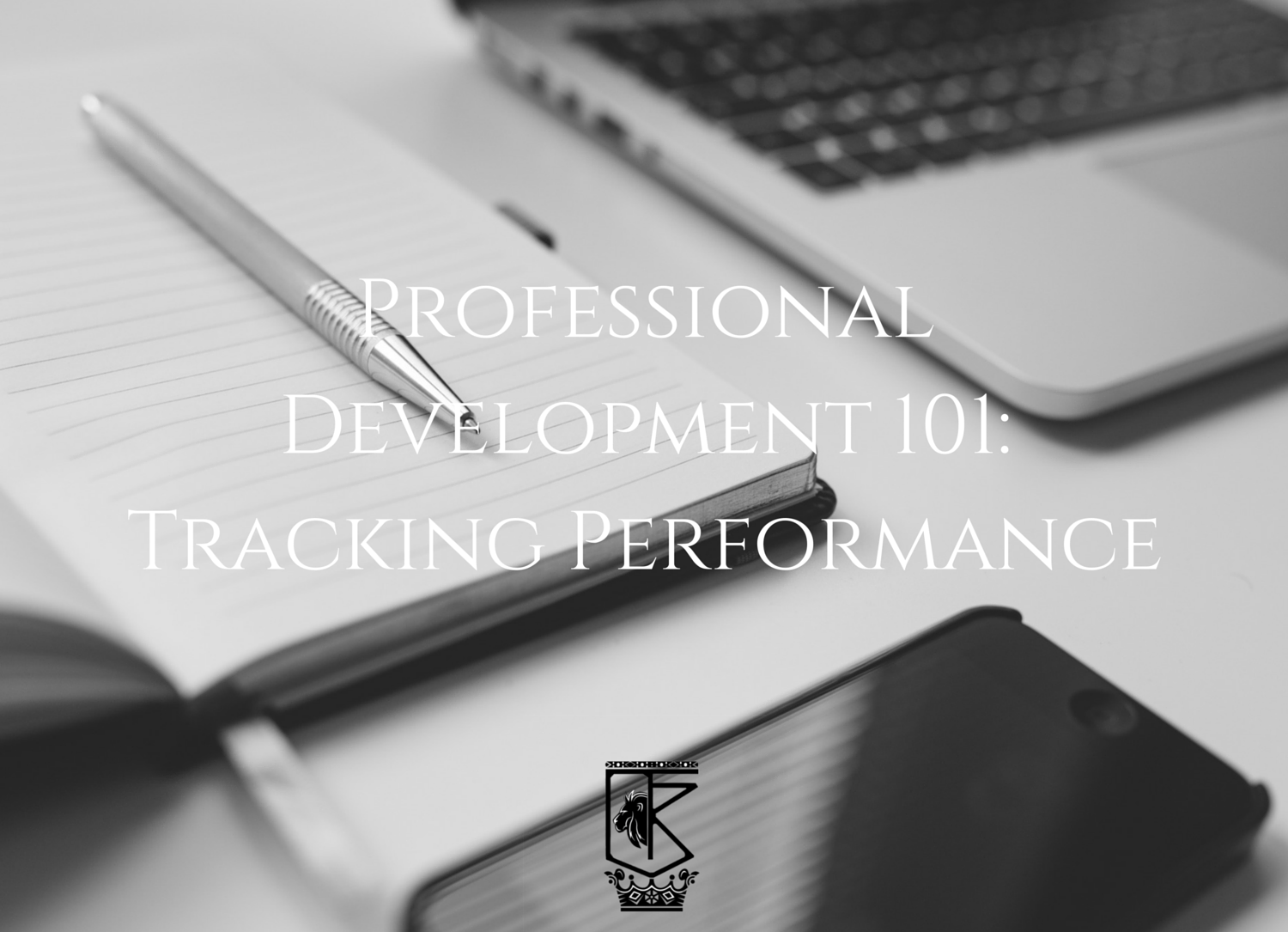Tracking is everywhere.
We check our phones to track the weather. And watch the news to track the happenings around the world. We can track our animals and grandparents with little chips just in case they become lost. We like to track our packages, especially when very excited about receiving that new product or self-styled birthday gift. As business owners, we track (or try to) every cent’s disbursement and entry to and from the bank account. And at tax time, we make damn well sure we track how much we’re to pay or to be paid by that newly-drawn Uncle Sam from H&R Block who says, “Get Your Billions Back America!”
But why don’t we track our own professional performance?
This is quite the conundrum, as having or lacking this data is just as critical to our career ascension as accounting is to the basic financial structure of our new venture.
We exist in a work environment now where the employer no longer feels the compulsion to provide all of the needs of the employee, so she may stay at the job for years to retirement. Perhaps the system used to operate this way, before my time. Nonetheless, it’s important to accept…
Professional Development is Your Responsibility
When I talk with a potential client or student, in the middle of a discussion I tend to ask about personal hobbies. Sometimes they’ll speak about something they’re passionate about impromptu and this gives me a chance to dig in. A few minutes into the subject and I can quickly see how the eyes light up, the energy changes and there’s a body-mind upgrade just by creating a space where they can express their authentic interests. But when I inquire about what’s being done with those passions, they’re usually allowed to remain just that, a passionate hobby.
We all have an area or multiple that really urge us to wake up in the morning and take action. We just don’t track them. We’re gravitated towards experiences and types of people and interests and adventures. We just can’t put our fingers on exactly what they are because we don’t track them. And since we don’t track them, it becomes difficult to isolate and improve upon them.
The world is full of information and resources today, ladies and gentlemen, not to mention challenging job markets with mysterious industries forming that don’t make the headlines right now. If you want to know about what they are, I suggest reading Future Smart.
Employers have access to a high volume of candidates who, in their eyes, look the same:
Name: John Doe
Occupation: I’m looking, duh
Work Experience: Sure, just copied the descriptions from all my past jobs and pasted them here
Education: Sure, I got degrees
Skills: I just made some of them up and some are real; can’t tell you how I got them though
Why should I hire you: Never really thought about it, look at my resume, that’s enough
Especially in a world where just about anyone (in this nation) can create a personal website or blog, there really is no excuse to rely on a resume to raise your influence and help you stand out. It won’t for a few reasons:
Your resume is brief and your professional history isn’t really brief. Even if you’ve worked on a job for 6 months, I bet with enough conversation, I could pull out several experiences that highlight more than what’s actually on your resume. One exercise: choose a day and journal your job experience. Write down all of the tasks you’ve done, the meetings you’ve gone to, any surprise projects and customers/clients you work with. You’ll likely have more info in that journal entry from that one day to fill up a one-page resume by itself.
Your resume isn’t written to prove anything. It’s possible you’ve written your resume like a general list of what you’ve done. But your resume is really like a lawyer’s case; you’re building up evidence to prove you’re qualified and credible for something. Have to treat it that way. This will naturally happen if you practice the previous exercise.
Your resume only makes up a part of your professional portfolio. This last one gives credence to why we should be tracking every inch of our professional development. The resume is one element in a larger portfolio we should be compiling for ourselves. It takes more work, more precision, but this is a process of simultaneously curating for your own brand, an employer and any level of professional to realize your value. When you take a healthy assessment of your experiences, counting nothing as “just work,” your mindset changes. You become a professional development hunter, seeking opportunities on the job instead of a passive worker who just does work.
Basics to Building Your Professional Portfolio
Find a place to host your content. A website, blog or some digital format is imperative. You don’t have to pay for a service initially so don’t let money be a reason you can’t start. Just start. Think Wix, WordPress or Squarespace.
Tabs to think about include:
An About section: This describes you, a holistic version, your personal mission, what you aim to do in the world.
Work Samples: Doesn’t matter what field you’re in, if you’ve worked, you have work samples. These “samples” don’t have to be creative. If you’ve been a part of a project team, you can describe the project and how it turned out, who you worked with and what it took to bring the project to completion. Doesn’t matter if it was a 2-hour or 2-day project. Record it.
If you’re a creative and concerned about sharing your work, I suggest to step over this fear. Our minds can endlessly create; putting a few out there doesn’t mean the imagination dries up or those will be the only creations you’ll ever produce again. If you don’t show at least SOME of your samples, who will ever see what you can do? Find a way to watermark or put a seal or logo over the images to protect them.
Skill Demonstrations: This too requires investment in self-reflection. If you don’t think about what you’re good at or desire to improve on, you won’t have a measurable skill to track and improve, and it’ll be incredibly difficult to have a professional-level conversation about them. Take a self-inventory and objectively look at those areas you both excel and fall behind at. You can even connect your skills to your work samples to show how you utilize them in real-time.
Education: This is education beyond formal schooling. The assumption here is you are actively seeking out experiences, courses, certifications, small classes or any type of independent learning that can enhance your profile. You’re doing this not to kiss up to anybody, but because common sense dictates the more you invest in yourself, the greater a professional and human being you will naturally become, which will consequently influence your life decisions. Perceive learning as a lifelong process and not an experience confined to classrooms, textbooks, financial aid and studying for tests. Think: Coursera; Codecademy; edX; 92Y; Learni.St; Degreed
Business Card: Such a subtle addition but it will take your professional aura up a few levels, and the digital world will find a difficult time completely replacing it. I emphasize: you don’t need to work for a company or be an “official something” to have a business card. To the Japanese, the meishi is part of your professional identity. It’s a tool that gives others a sense of who you are in a short amount of time, and by leaving your card with someone (including your portfolio site, blog, etc.), you’re giving them an opportunity to connect beyond a superficial level.
Resume & CV: I encourage creating a resume (our brief U.S. Document) and the curriculum vitae, a much more in-depth version of your professional experience (most countries use CV actually; we’re the oddballs). This gives you the option of sharing one or both depending on the contact you meet. They should be uploaded to your portfolio site.
Recommendations & References: Here’s Why
https://youtu.be/SwIFVvghW10?list=PLbZwI7nI-IPHkk8vCOnzFEeSut2MysfGe
And when you “touch” a company or LinkedIn contact, you can be assured that they’ll scan your profile, whatever it looks like at the time. Why not have the best positioning to maximize your influence?
Sun Tzu, Machiavelli and other great strategists all speak about positioning, knowing where you stand on the chess board. If you make moves without diligent preparation, you’re sabotaging opportunities that could be yours.







[…] Performance tracking […]